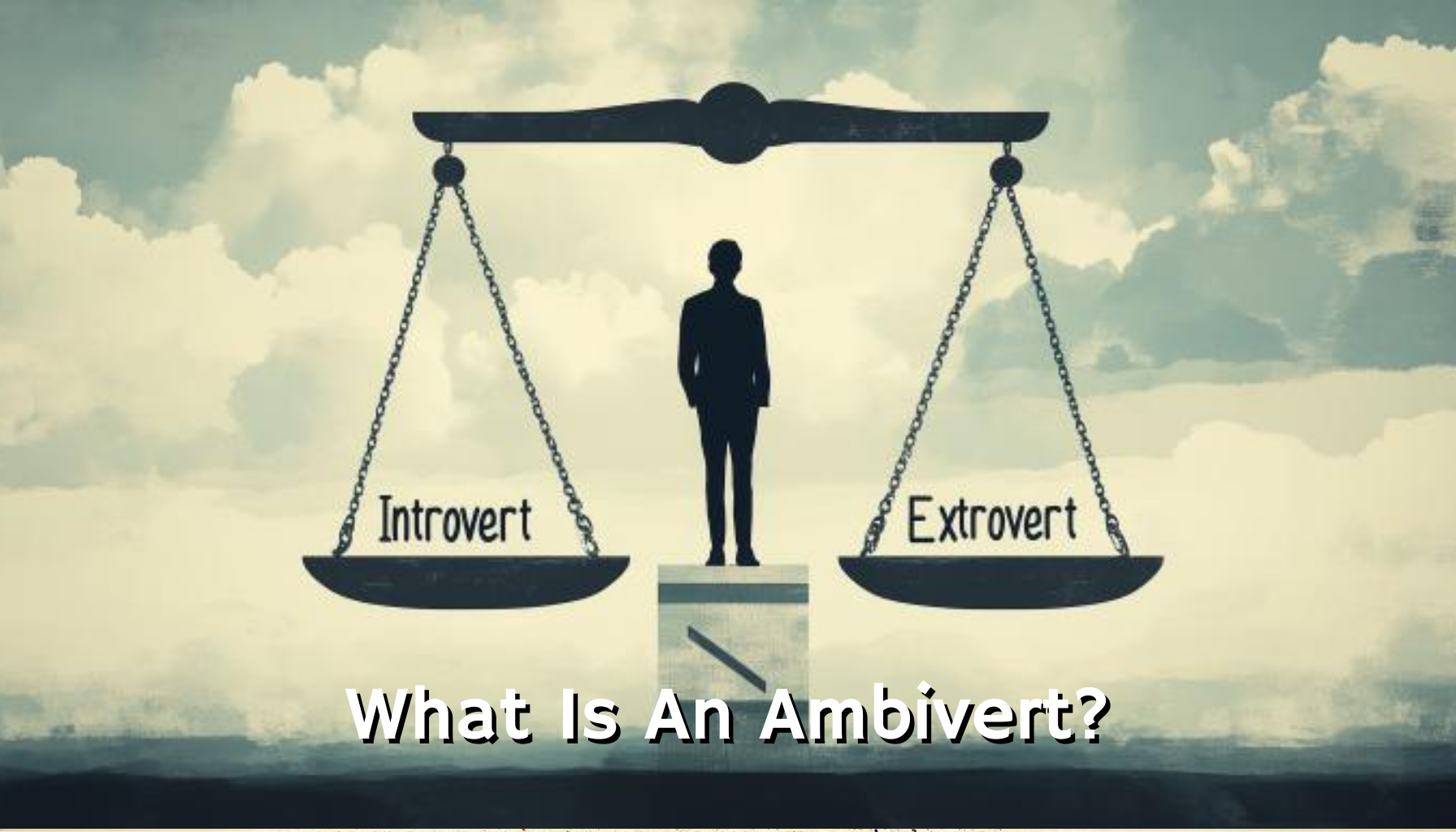Ambivert Definition: Signs & Characteristics of an Ambivert Person
Are you someone who feels energized in social settings but also enjoys time alone to recharge? You might be an ambivert — someone who naturally balances both introverted and extroverted traits. Learn the 11 signs that suggest you’re an ambivert, and discover how this unique blend of personality traits can help you excel in both your personal relationships and professional life.


Back
7 mins read
Personality types are often discussed in terms of extroversion and introversion. Extroverts are energized by social interactions and external stimuli, while introverts recharge through solitude and internal reflection. However, not everyone fits neatly into these two categories.
If you’ve ever taken a personality test, such as the MBTI, you might have related to descriptions of both extroverts, who love socializing and meeting new people, and introverts, who prefer solitude and close, meaningful connections. This is common because introversion and extroversion exist on a spectrum, and most people fall somewhere between the extremes rather than being entirely one or the other.
Recently, psychologists introduced the concept of ambiversion to describe those who exist in the middle of this spectrum.
Ambiverts possess qualities of both introverts and extroverts, and their behavior often shifts depending on the situation. Ambiversion is also recognized in the Big 5 personality model, where the dimension of Extraversion vs Introversion assesses how individuals navigate between social and solitary environments.
Unlike omniverts, who experience extreme shifts between introversion and extroversion, ambiverts tend to maintain a more balanced and adaptable approach, blending social interaction with periods of introspection.
Let’s dive deeper into what it means to be an ambivert and explore the characteristics that define this flexible personality type.
What Is an Ambivert Personality?
An ambivert falls in or around the middle of the introversion and extroversion spectrum. Ambiverts have a balanced personality as they combine the qualities of introverts and extroverts, depending on the context, mood, or goals, which makes ambiverts very flexible.
Their balanced personality helps them adapt to different situations, and they can find fulfillment in attending social events when required or staying in bed curled up with a good book.
Someone who falls completely in the middle between introversion and extroversion is rare, so most ambiverts are either “introverted extroverts" or "extroverted introverts," depending upon which of the two characteristics shows themselves more.
In some cases, ambiverts are called “outgoing introverts” or “anticosial extroverts," which underlines the duality and ambivalence of their personality. Most psychologically stable people are ambiverts, which allows them to function effectively in various contexts.
Eleven Signs You Are an Ambivert
Psychologists describe ambiverts as perfectly balanced on the introversion and extraversion spectrum, displaying elements of both traits. This is why you're ready to hang out with friends and have a good time outdoors for one minute, and the next minute, you're craving your alone time in the comfort of your home. This is also why you enjoy attending parties, being in the spotlight, and needing the next few hours away from public attention.
Here are eleven signs that you are an ambivert. You should be able to relate to most of these signs if you are an ambivert.
1. You Present Different Versions of Yourself to Those Around You
When you ask people around you to describe you, they usually have different versions. While some people describe you as quiet and reserved, others believe you are social and outgoing. Both versions are true because those people describe you based on what they see. You lean more towards the extroversion trait when hanging out with extroverts and channel your inner energy when you’re with introverts.
2. You Enjoy Meeting New People But Only Want a Few Close Friends
You find approaching strangers, building casual conversations, and making new acquaintances easy. You know and relate well with almost everyone at home and work. You usually hang out with several friends but only have a few close friends you trust and share your problems with.
3. You Love Attending Social Events, but You May Feel Drained Afterward
You feel excited when you attend social events. You even exert yourself and have genuine fun while sometimes being the center of attention. However, intense socializing usually drains you, and you start craving your alone time. Too much alone time bores you, and too much socializing drains you.
4. You Can Empathize with Introverts and Extroverts Alike
You find it easy to put yourself in your friend's shoes, whether he is an introvert or extrovert. You can relate to them and get the full picture when they come to you with a problem. This helps you know when the right response is to listen attentively and console them or offer practical solutions to help them escape their jam.
5. You Can Lead a Group of Diverse Individuals
A study in the Harvard Business Review showed that extroverted leaders are more effective when they lead passive employees requiring direction and guidance. The study also showed that introverted leaders are perfect for proactive workers. Leaders do not choose their followers, and most workplaces have a mixture of passive and proactive workers. As a balanced personality, an ambivert is the recommended leader for a diverse workplace.
6. You Are a Good Listener, but You Also Build Great Conversations
You possess the listening quality of introverts, but you aren’t shy about expressing your thoughts in a well-articulated manner like extroverts. You’re also intuitive, so you know the right time to listen and absorb information and the time to express your opinions or offer advice.
7. You Share Hobbies with Introverts and Extroverts
Extroverts want to spend time with others as much as possible. Their hobbies usually require hanging out with others and participating in group activities. They also fancy outdoor events and detest spending time alone. Introverts are reserved, and their hobbies reflect that. They try their best to avoid group or outdoor events that require them to collaborate with others and have fun. They prefer solitary events or hobbies that they can do with a few close friends.
Ambiverts enjoy the hobbies of both traits. Sometimes, they want to be alone and read a novel, while other times, they want to hang out with friends and partake in outdoor sports.
8. You Can Adapt to Different Situations
Any situation you find yourself in doesn’t faze you. You can behave accordingly and even grab the spotlight when you find yourself in social circles. But that doesn’t mean you want to do it constantly. Similarly, you can have a great time when you’re alone.
9. You Have Introvert and Extrovert Friends
Ambiverts usually have a diverse group of friends featuring introverts, extroverts, and fellow ambiverts. When you want to unwind on a Friday night after a long week, you usually prefer to hang out with your extroverted friends, who usually guarantee a good time. Other times, when you're in the mood for some peace and quiet but not willing to be alone, you hang out with your introverted friends.
10. You Are Independent but Also Enjoy Group Work
When required to complete a task alone, you’re up for it. You’re an independent person who enjoys solving problems on your own. You’re just as excited if the job requires you to work in a group. You love collaborating and brainstorming ideas with colleagues. Your favorite job is one that allows you to work independently but also provides opportunities for group work.
11. You Don’t Mind Small Talk, But You Prefer Deep, Meaningful Conversations
Introverts believe small talk is pointless as it provides little value to the conversants. So, while they avoid small talk, extroverts enjoy it as they feel it is necessary to ease the tension and show the other party you care. As an ambivert, you do not mind having small talk with people you're not close with. However, you prefer having deep, meaningful conversations with your close friends.
Benefits off Being an Ambivert
Being an ambivert comes with a set of benefits and advantages, and all of them can be attributed to extreme adaptability to various situations and scenarios. The fittest survive, and ambiverts possess a great deal of social flexibility, allowing them to thrive in both introverted and extroverted environments. This adaptability helps them build meaningful relationships, navigate diverse social settings, and excel in both collaborative and independent tasks. Here are just a few benefits of being an ambivert:
- Work-related Versatility: Ambiverts can work effectively both in teams and independently. They are well-suited for various positions and can strive in various work environments.
- Effective Leadership: Ambivert leaders can act as chameleons and adjust to the composition of their team. They can utilize different leadership approaches and strategies to motivate their subordinates and improve team performance.
- High Stress Resistance: Ambiverts have great mood regulation, which allows them to deal with negative emotions more easily.
- High Learning Ability: In certain scenarios, ambiverts can learn better than extroverts or introverts. Their learning styles allow them to learn independently and gain knowledge through social learning.
- Higher IQ: Some studies indicate that ambiverts have higher IQ scores compared to extroverts and introverts.
These are just a few of the many benefits that ambiverts experience due to their balanced personality traits. In essence, ambiverts are natural adaptors, capable of flourishing in various environments by harnessing the strengths of both introverts and extroverts.
Do Ambiverts Have The Edge over Introverts and Extroverts?
You have to admit that having a balanced personality helps you adapt to most situations you find yourself. While extroverts tend to be bored when alone and find it hard not to contribute to a conversation even though they are only required to listen, introverts can sometimes be described as socially awkward and shy.
Ambiverts can combine the best qualities of both traits and apply them in moderation. They are also better able to deal with the extremes of both traits. They can be great listeners when you need to vent your frustrations but also contribute meaningfully to the conversation when you need advice. They are comfortable having introverts and extroverts as friends because they can provide the perfect complement and balance as required.
They also have better career and relationship prospects because of their balanced personality. According to research, ambiverts outperform introverts and extroverts in sales positions because they are confident and assertive enough to persuade customers to buy their products, listen to customer concerns, and genuinely empathize with them. Ambiverts are perfectly balanced, as all things should be.
Nevertheless, it is wrong to claim that ambiverts are better than introverts or extroverts in every scenario.
Each personality type has its own unique strengths and weaknesses, and the effectiveness of any trait depends largely on the specific context. For example, introverts may excel in roles that require deep focus and independent problem-solving. At the same time, extroverts often thrive in highly social and dynamic environments where their outgoing nature can shine.
Ambiverts may have a versatile advantage, but that doesn't make them universally superior. The key is recognizing that each personality type brings valuable skills and perspectives to the table.


Return to Blog








